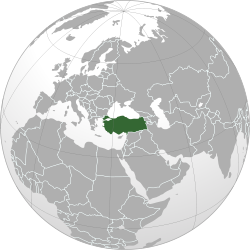Putin Arrives In Turkey For Energy And Syria Talks – OpEd
By JTW
By Harriet Fildes
The Russian President, Vladimir Putin, arrived in Turkey today to discuss two issues of critical concern to Turkey; the Syrian crisis and energy relations.
Russia has been the main ally of Assad, assisting him militarily, economically and diplomatically by using its veto in the United Nations Security Council to block any formal condemnation of the regime or the use of sanctions.

Erdoğan rightly assumes that any change to this intractable crisis necessitates a transformation of Russian foreign policy, which Turkish officials have argued is on its way as Russia becomes increasingly distant from the Syrian regime.
Whether this is currently occurring is debatable, however, the reasoning behind it sustains. As such, the Turkish government will use this visit to put diplomatic pressure on Russia to reduce its support for the Syrian regime as part of their broader strategy to place more international pressure on Assad in order to hasten the end of his rule.
Speaking last week in Spain, Erdoğan discussed the Syrian crisis, asserting that “Right now, the key is in Russia’s hands.” Erdoğan further argued that if Russia were to change their policy, Iran, Syria’s other key ally would be forced to do the same. The withdrawal of Syria’s two core allies support would obviously be a turning point in the balance of power of this crisis.
However, given the Russian government’s staunch support of Assad and the economic benefits reaped from this crisis which include an arms contract worth billions of dollars, it seems unlikely that Russia will back down any time soon.
It is more likely that these talks may ease the diplomatic tensions felt between Russia and Turkey, which have peaked due to divided opinion on Syria, Turkey’s interception of a Russian passenger plane on its way to Damascus and Russia’s vocal criticism of Turkey’s Patriot missile request.
This argument is supported by Putin’s chief foreign policy aid, Yuriy Ushakov, who states that today’s “exchange of views should lead, if not to a tie-up of positions, then at least to a better understanding of each other’s actions.”
Any pressure Erdoğan can place on Syria is severely constrained by increasing reliance on Russian oil and gas, currently composing 60% and 35% of Turkey’s total energy imports. Furthermore, Russian tourism is a crucial sector of Turkey’s economy with around three and a half million visitors every year.
Due to a lack of diversity in gas suppliers, Turkey is particularly dependent on Russian supplies during its difficult winters, during which daily demand could reach 220 million cubic meters, compared to 125 million last winter according to Reuters.
Russia’s Energy Minister, Alexander Novak stated on Sunday that “As has happened many times in the past, we have always helped Turkey when they have experienced problems managing during the winter.”
Thus, discussion of the Syrian crisis may well be eclipsed by economic concerns. Plans to increase Turkey and Russia’s bilateral trade from $32 billion to $100 billion per annum were announced last time Putin and Erdoğan met in July.
Given this dependence, additional economic ties due to Russia’s contract to build Turkey’s first nuclear plant, and the expected signing of several economic, commercial and scientific cooperation agreements, divides over the Syrian crisis look to be played down during this meeting.
Davutoğlu stated on Saturday that “No one should take serious a scenario that Turkey and Russia will experience tension over Syria”, further asserting that “At the point where we cannot overcome [such tensions] we come to a point where Turkish-Russian relations are more important than all these fluctuations.”
Such discourse is supported by the increasing importance of Turkish-Russian economic relations and subsequent diplomatic easing of tensions over the aforementioned issues, such as the grounding of the Russian passenger plane which will not be discussed as they have “closed the case” according to the Russian Ambassador to Turkey, Vladimir Ivanovski.
However, Turkish officials claim that Russia is changing direction on the Syrian crisis is yet to be substantiated. Consequently, despite growing economic ties and significant diplomatic progress, Turkish-Russian relations could still take a turn for the worst, particularly with the NATO vote on Patriot deployment drawing closer and fear from the Turkish government that the regime could begin using its considerable chemical weapons or ballistic missile caché.
